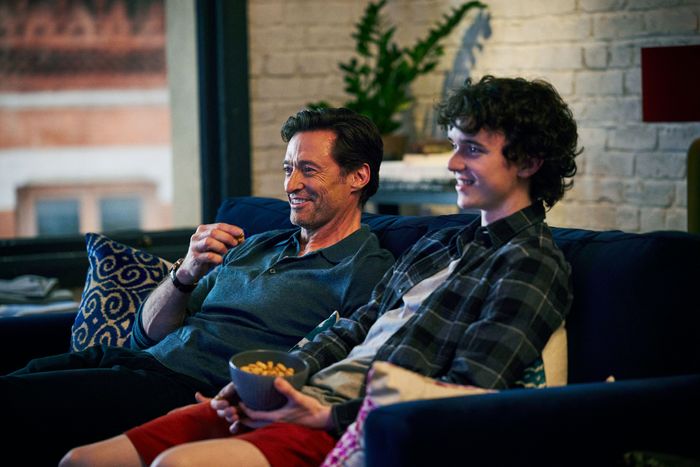
After watching The Son, I went back and rewatched The Father, French playwright turned filmmaker Florian Zeller’s 2020 directorial debut, to see if it really was as good as I remember it being. And honestly, it’s better than good — it’s an all-timer, a mundane horror movie of crushing effectiveness in the guise of Oscar bait. Over the course of its ingenious depiction of dementia from the inside, it transforms a regular London apartment into a hall of mirrors and a small cast into a disorienting ensemble of untrustworthy caretakers, anchored by an Anthony Hopkins performance as fearlessly flinty as it is full of pathos. The Father is such an achievement that it’s hard to believe The Son was made by the same person. Zeller’s latest stars Hugh Jackman as a New York lawyer with a struggling teenager from his first marriage, and it’s everything The Father wasn’t — emotionally unconvincing, dramatically rote, and unapologetic about treating a child’s depression as a parental burden. It’s bad enough to make me wonder if The Father was a fluke, representing some unrepeatable confluence of everything Zeller does well, with the rest just being empty showboating.
Play adaptations are difficult in general and rest on theatrical conventions ( like the need to gather characters in one place for long bouts of conversation) that are always in danger of feeling claustrophobic and contrived onscreen. Both of Zeller’s features to date have been adaptations of works written for the stage: The Father made its way to the West End and Broadway after debuting in Paris in 2012, while The Son premiered in Paris in 2018. (Completing this family trilogy is the unadapted The Mother, which premiered in 2019 in an Atlantic Theater Company production starring Isabelle Huppert and Chris Noth.) But artificiality was a feature, not a bug, for The Father, which takes place inside the unsteady reality experienced by Hopkins’s character. The Son is more straightforward and lands awkwardly somewhere between naturalism and the deliberately heightened. Its stiltedness is compounded by the strangeness of its synthetic New York, which sits outside the windows of the spacious apartment Peter Miller (Jackman) shares with his wife, Beth (Vanessa Kirby), and their baby like a digital backdrop.
Is it possible that two monied New Yorkers would handle their child’s depression poorly? Absolutely. Is it likely that they would be as unfamiliar with the very concept of depression as Peter and his ex-wife, Kate (Laura Dern), seem to be? It would be more believable if their son, Nicholas (Zen McGrath), had by this point seen every therapist and psychiatrist in the city, taken a variety of meds for a test-drive, and watched his treatment become a topic of discussion among the parents of classmates dealing with their own mental-health journeys. But Nicholas isn’t even a pawn in an embittered split, as he appears to be at first, getting shuttled back and forth between Kate’s Brooklyn home and Peter’s Manhattan loft — that, at least, would feel like a human dynamic. The Son seems as baffled by Nicholas’s struggles as Kate and Peter are, regarding him as if he were a curly-haired alien, an effect compounded by McGrath’s Tommy Wiseau–esque bleat of lines like “I feel like my head is exploding!”
Peter left Kate for the younger Beth, with whom he has started a new family, and in some ways, Nicholas serves as a ghost of the past as well as a sort of karmic punishment for the reset his father pulled on his home life. It’s not exactly an empathetic perspective on a child’s depression, and while Peter reacts with denial, frustration, and some wallowing in his own insecurities about fatherhood, the movie can’t reckon with mental illness as anything more than an abstraction. If it were sharper and more immersed in Peter’s mind-set, The Son might have been able to pull this off — making Nicholas’s unpredictability more plausibly frightening and Peter’s self-centeredness more arrogant and all-consuming. But aside from a sequence taking place in one character’s imagination, Zeller doesn’t angle the proceedings as subjective, and Jackman, offering up a performance of light phoniness, appears unwilling to play Peter in a way that would read as unsympathetic. Because of this, the film settles into a tone that’s curiously reminiscent of a high-end PSA, up to and including a literal Chekhov’s-gun scene. The ending may be heavily foreshadowed, but that doesn’t make the lead-up any less exasperating or what happens any less egregious. The Son is meant to be a parental nightmare, yet its only effective scene is the one in which Anthony Hopkins turns up to exude frost for five minutes as Peter’s own semi-absent dad. Hopkins is so good that he could be in a whole other movie — which I guess he is. Just watch The Father again.
More Movie Reviews
- The Accountant 2 Can Not Be Taken Seriously
- Another Simple Favor Is So Fun, Until It Gets So Dumb
- Errol Morris Has Been Sucked Into the Gaping Maw of True Crime


